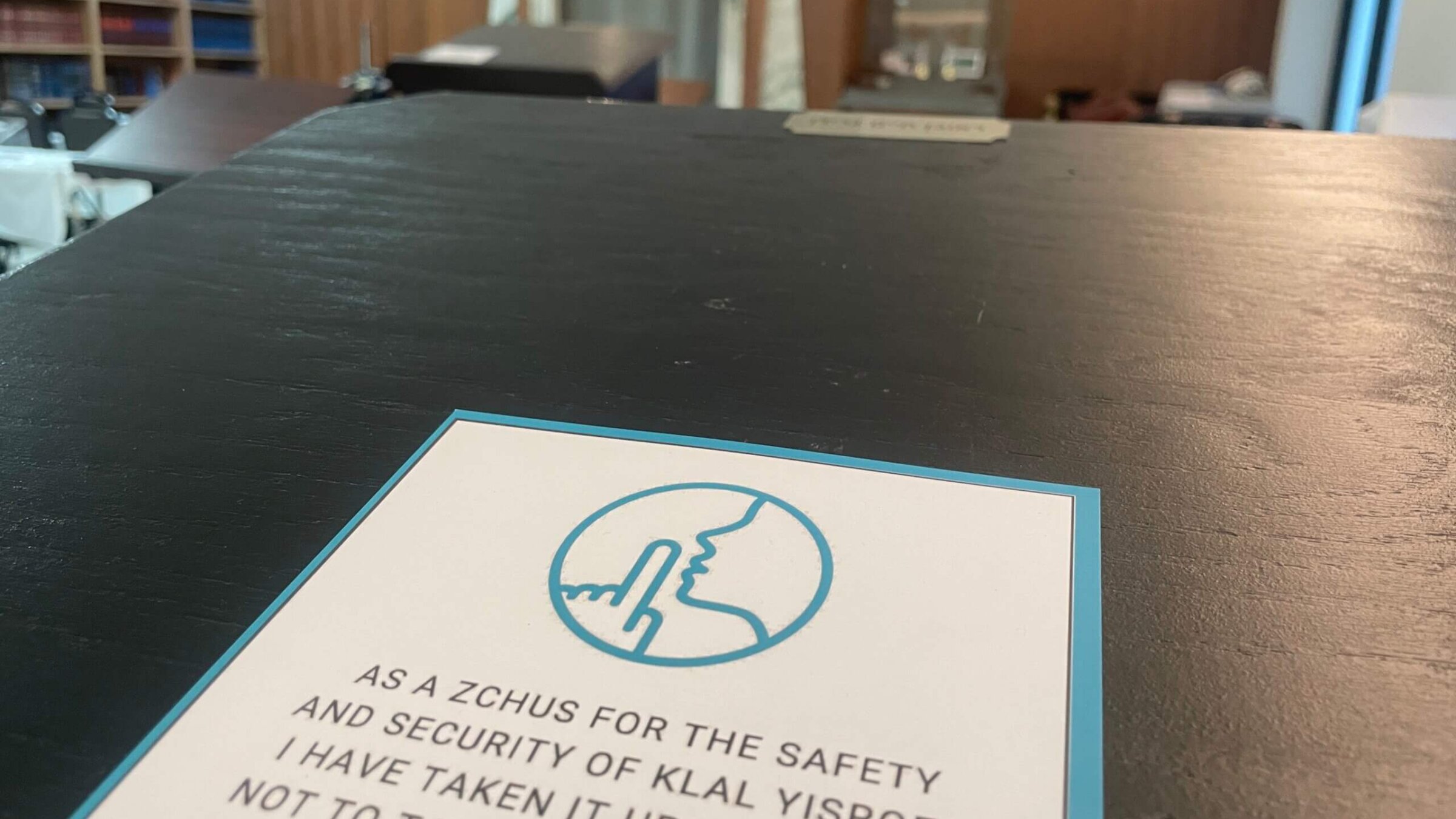To support Israel, they’re saying nothing at all
A commitment to not talk during prayer services — for months — has more than 1,000 signups in just five days

A card inside Congregation Ohr HaChaim in Los Angeles reminds visitors not to talk during services as a merit to the Jewish people. Photo by Louis Keene
Daniel Heyman’s excited young nephew ran into synagogue last Saturday, speechlessly gesticulating for his confused cousins to join him outside. Why couldn’t he just tell them what was out there? Their dad — though he knew what was going on — couldn’t explain.
Not even a solar eclipse could break Heyman’s vow of silence.
Since Hamas’ Oct. 7 attack on Israel, many American Jews have complemented their vocal and financial support for Israel with a variety of religious practices, including Friday night candle lighting, daily wrapping of tefillin and a community fast last week. Heyman, who is Orthodox, has taken on a different obligation: He has committed to refraining from talking during prayer services.
No idle chatter, no Shabbat Shaloms, no grousing about the Dodgers and no explaining solar eclipses. Just quiet, focused prayer. For the entire two-plus-hour duration.
“The most that we can help to protect Israel is through tefillah,” or prayer, said Heyman, 38, who attends Congregation Ohr HaChaim in Los Angeles. “And the best tefillah is where there’s no talking.”

No talking — until next year
It’s not just Heyman — his whole congregation is doing it, kids included. And it’s not only Ohr HaChaim: A WhatsApp group created last week for Jews staying mum during Shabbat services has already maxed out at 1,024 members, and a spillover group is filling up just as quickly.
By joining the group, you agree to refrain from talking during Shabbat morning services until the week of the first Torah portion of Exodus — coincidentally, the first Shabbat of 2024. (There’s not much gabbing in the group, either.)
Yudi Arem, an entrepreneur who lives in Boca Raton, started it with two friends he met during his studies in Israel as a teenager. Their initial goal was 40 sign-ups.
Saturday morning services for many Jews, Arem admitted, “is like the centerpiece of people’s time to talk. But we felt like it’s something that people can come together and be like, ‘We’re not doing this together.’ And they could come away with something substantial.”
Ohr HaChaim began its silence Oct. 9, after the synagogue’s spiritual leader, Rabbi Shlomo Klein, advocated for it that night at a special prayer service for Israel. Now, a sign on the door to the sanctuary and greeting cards on the tables inside remind visitors that the community has undertaken the effort.
How to not talk — politely

Asked how silence during prayer related to the war in Gaza, where more than 150 Israeli hostages are believed held, Heyman invoked the Biblical adage of “Hakol kol Ya’akov, v’hayadayim y’dei Esav,” which means that Jewish strength is in spirituality (“the voice of Jacob”), whereas its enemies’ lies in physicality (“the hand of Esau”).
“It’s either one or the other that’s going to win,” Heyman said. “If your kol Ya’akov is strong enough, then you don’t have to worry about y’dei Esav. And there’s no question that our voice is very powerful.”
According to halacha (Jewish law), talking is strictly prohibited during some parts of services, such as the Sh’ma and the repetition of the Amidah, and discouraged during the rest. How much banter actually occurs varies by the synagogue.
To ward off temptation — and mutual embarrassment — Zish Margulies, a vow-taker who lives in Brooklyn, hung a sign on his chair informing other shulgoers of his commitment.
Margulies had been in Jerusalem on the day of the attacks — brewing coffee before heading to shul — when he heard the air raid sirens. He was staying not far from an Iron Dome battery, which meant he could not only hear the interceptions of Hamas rockets — he could feel them. He spent much of the morning in and out of the bomb shelter.
He debated bringing home his daughter, who is in seminary there, but ultimately decided not to, a decision he said forced him to wrestle with Jewish notions of faith and free will. That’s remained on his mind as he channels his kavanah, or intention, in his prayer.
A month ago, he would have been the type to wish a good Shabbos to someone who sits down next to him. Now, it will be a handshake and a smile. Then, back to the prayer book.
“It’s created an elevated feeling during the tefillah, that’s for sure,” he said.






















